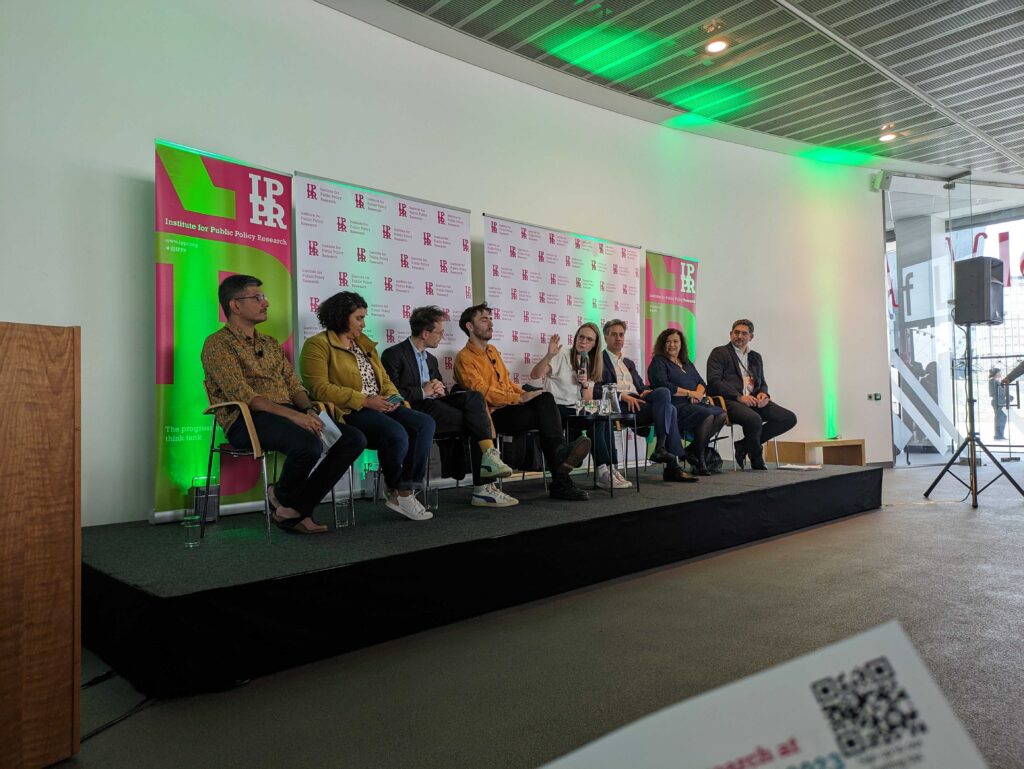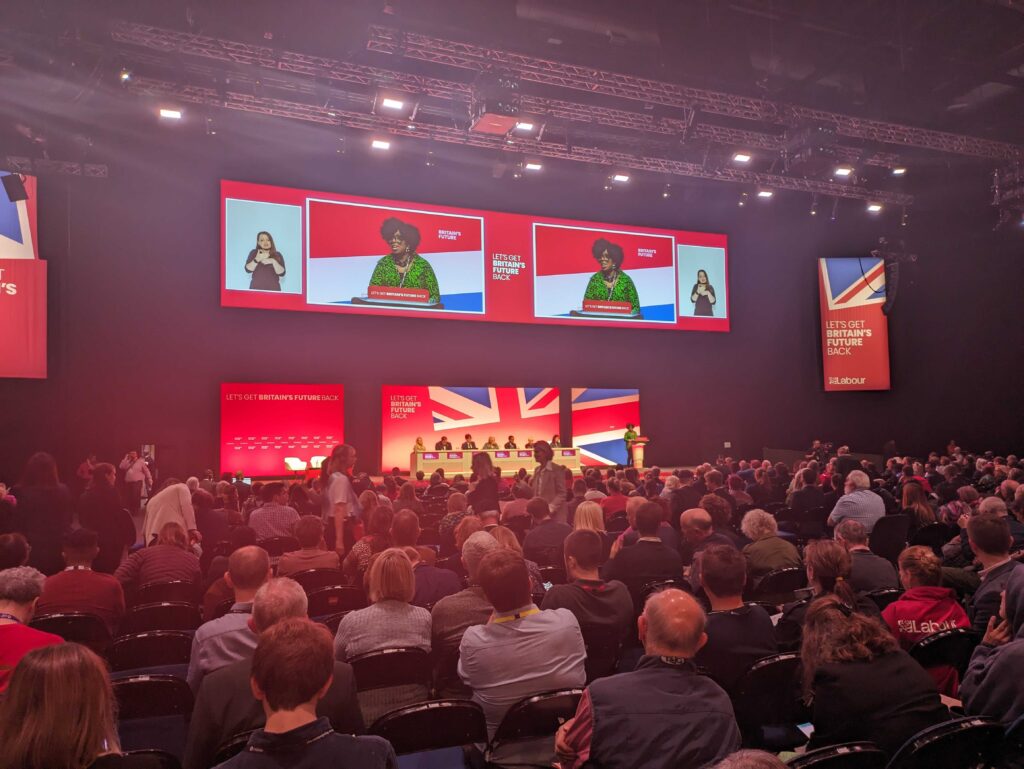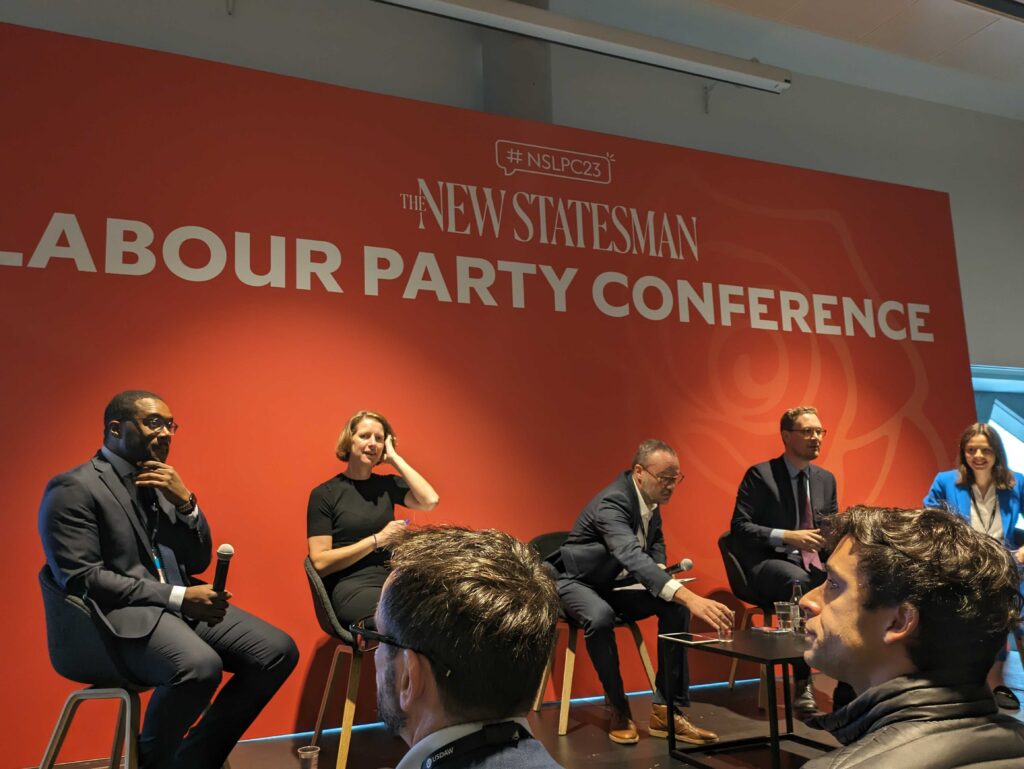Good Things at Labour Party Conference ’23
As the UK's leading digital inclusion charity, it's important that we raise awareness of digital exclusion - by providing insights at political party conferences and gaining support for our cause. Our new policy assistant, Urko Beltran de Guevara, shares his observations and insights from Labour party conference.
From levelling up to digital futures, the Labour conference is rife with debate and discussion.
Helen Milner, CEO, and Hannah Whelan, Advocacy Manager, and I are right in the midst of it, advocating for tackling digital exclusion in every part and corner of the UK. We will be blogging our experiences every day, so stay tuned for a look inside one of the most significant political events on the calendar.
Sunday 8 October
It is an unusually temperate and sunny day in Liverpool — at least for early October — and the Labour conference is getting underway. On Saturday night, news of a Rutherglen by-election win broke, further brightening the forecast for Labour members. Many are overjoyed, believing that the recent result is confirmation that Labour is well on its way to government.
Rishi Sunak presented himself as the change candidate at the Conservative Party conference last weekend. Will the Labour Party pick up the baton? The public, media, civil society and businesses are watching to see how far Keir Starmer will stray from his cautious approach.
Restraining from policy commitments this far out from an election is not unusual for a party in opposition. Nevertheless, some Labour insiders argue that thin policies reflect Starmer’s ‘timidity’. They warn voters may associate the party with little value. Yesterday morning, Victoria Derbyshire showed Starmer a word cloud illustrating what the voting public thought of him, ‘Nothing’ being the most common response.

At an IPPR debate on Sunday, Ed Miliband accused the Conservative party of false accusations of a meat tax, adding: ‘If they want to fight on net zero, bring it on’. Tomorrow Ed is set to announce ‘GB Energy’, a publicly owned energy company that will help deliver clean power by 2030. There is a strong suggestion that the Labour Party is planning to pick up the PM’s challenge of making Net Zero a dividing line at the next election.
Digital inclusion may be a part of a future green policy package.
In its last policy development cycle, The Labour Party produced ‘A green and digital future‘, highlighting policies that would tackle the digital divide as well as contribute to economic growth.
Tackling the digital divide is a means to solving so many other issues, including climate change. And our work is a testament to that.
For example, the increasing size of e-waste and planned obsolescence can lead to toxic pollutants in our land and rivers, as well as carbon emissions from incineration and mining of new materials. Our National Device Bank shifts ‘end-of-life’ mobiles and devices to secure reuse for vulnerable communities.
Labour conference is a great time to drop previous policy commitments and adopt new low-risk and high-impact policies. If the Conservatives ever release their response to the House of Lords Digital Exclusion report, the Labour Party could knock two birds with one stone by committing to reusing all tech for good and donating old government devices to our National Device Bank. The policy is well within Labour’s centre of gravity: ‘stable public finances and prudent spending’. And sends a clear message on Net Zero.
Monday 9 October
It’s day two of the Labour Party conference and the place is bustling with activity. In the faintly brackish air of Liverpool’s docks, Labour members and delegates line up to enter the conference — eager to make the most of today’s activities.

The story dominating the media today is Hamas’ attack on Israel. No matter how much or how well Shadow ministers lay out their vision against the Conservative party, rolling coverage of the bloody conflict will diminish their reach and impact in shaping voters’ opinions.
As Stephen Bush writes, “Everything shadow ministers announce this week will have to be repeated, because absolutely none of it is going to register with the British public now.”
Nonetheless, Shadow Ministers took the opportunity to galvanise conference-goers and speak directly to industry leaders, determined to illustrate that Labour is a government in waiting.
Shadow Chancellor of the Exchequer, Rachel Reeves, presented a bold break from globalisation in favour of nationalism, branded ‘Securonomics’. At the same time, she ruled out a host of taxes, continuing a cautious approach.
Before her speech, Reeves said Britain’s “public services are on their knees”, but her speech lacked any real commitments for resolving this and ruling out taxes severely limited her ability to lay out a transformative alternative.
New policies tackling ‘waste’ included a Covid corruption minister and reinforced ministerial rules, as Reeves also attacked the ethics and standards of the Conservative government.
While some will be turned off by the self-described “Iron Chancellor”, the vocal support of former Governor of the Bank of England, Mark Carney suggests that the Labour Party seems to have the upper hand when it comes to the economy — a welcome departure from the last 13 years.
The message of economic credibility rang throughout this year’s conference. Upstairs from the conference hall, Darren Jones MP, Reeves’ number two and Shadow Chief Secretary to the Treasury, emphasised that a Labour government would rebuild Britain, particularly in terms of skills in the economy.
How? By utilising the power of technology across government. “Tech has to be inherent in everything from delivering economic growth to public services” and for that reason, Jones claimed, tech is not the responsibility of a single department but embedded in each one.
Those of us in the digital exclusion space know that a digital strategy requires cross-collaboration between government departments. Over 10 million people lack basic digital skills across the country and many million more experience digital exclusion in some form or another.
Digital exclusion is a multi-layered, cross-departmental issue. In order to fix the digital divide, at the bare minimum, five Government departments would need to be involved including: Department for Education, Defra, Department for Digital, Culture, Media and Sport, Department for Science, Innovation and Tech and the Department of Levelling up, Housing & Communities. We also know the transformational change that can take place when devolved nations and regions set out their own digital strategy, as they have in the West Midlands Combined Authority.
The breadth of the challenge and the number of departments involved suggest civil servants cannot tackle digital exclusion independently. Government silos risk short-sightedness, wastefulness and duplication.
The Labour Party must present a clear outline of its purpose and objectives when it comes to digital exclusion. Particularly to show the civil service the benefits of cross-department collaboration and give regional and devolved Governments enough time to design digital inclusion strategies consistent with a Labour approach.

Tuesday 10 October
Day three of the Labour Conference and the place is teeming with excitement. Conference goers seem confident that power has finally started to shift to the Labour Party. Reeves’ impact in the City is palpable just as much as it was in the Labour Party. A new Labour Party is here. The shadow frontbench and the party more broadly seem happy and committed to its newfound discipline and ambition — a reality that seemed unimaginable under Corbyn.
Reeve’s answer to ‘Why Labour’ was fiscal discipline, whilst her speech lacked big policy announcements it garnered raucous applause. Later, the Labour Leader put forward his answer whilst attendees hoped for ambitious housing plans. Sceptics wondered how far Keir Starmer will go in terms of policy, particularly after Reeve’s emphasis on and influence of ‘Iron discipline’ throughout the conference and the party.
Off to an unexpectedly glittery start, Starmer quickly regained composure convincingly portraying himself as a break from the Corbyn era and a disciplined, confident, calm leader. “Protest or power, that’s why we’ve changed, that’s why we changed our party”, Starmer said before launching into his speech.
Ahead of the next general election, Starmer is keen to present himself as the candidate who changed the Labour Party. Sunak will likely bring up some of Starmer’s biggest vulnerabilities at the next general election including anti-semitism allegations and Keir Starmer’s shadow front bench position under Corbyn. Starmer has tried to turn this vulnerability into a strength.
In the process, Starmer’s Labour purged and marginalised Labour members and supporters — for many this is too big a price and may add to confusion over what Starmer stands for.
In the speech, Starmer promised a decade-long Labour party that would act as a healer, moderniser, and builder. In so doing, he placed himself as Attlee, Wilson and Blair all rolled into one, illustrating the scale of the challenge and the ambitions of a future Labour government.
The vision of Starmer is clearer than ever before. Starmer argued the Labour Party embodied conservative values of unionism, environmentalism, family and the rule of law.
The language was conservative, but the policy and vision was Labour “a future where we believe workers rights are good for growth. Inequality corrosive”.
The politics of community, family and locality has grown under Starmer and the memory of the service, sacrifice and community connection during Covid-19 played an important role in his speech.
Here at Good Things, our National Digital Inclusion Network embodies the same spirit of community, helping each other overcome hardships and become healthier, happier and better off. It’s the same spirit that helped a lot of us endure the lockdowns.
Digital connection enables people to access basic services but also offers an opportunity to reconnect with society, overcoming differences to find common values.
A positive vision for the UK’s future must involve harnessing the latent power in our communities through secure funding for digital inclusion hubs in village halls, cafes, and community centres across the country.
With this being said, investing in our Network, Databank and Device Bank is probably the most Labour thing Labour can do.
Reflections
Working, country, Britain, future, change.
These were some of Starmer’s most frequently used words during his conference speech. Reflecting his reformed Labour Party – and reform not being a term he’s shying away from either – conference season comes to a close with a buoyed Opposition, hopeful for an election.
What does this mean for the current Government? How can they enact change and get ahead in the polls?
Well, we have some ideas.
Underpinning the priority policies of both the Government and the Opposition is digital.
NHS, cost-of-living, housing, education, and even trains and towns have an essential digital access ingredient – as an individual or household, your experience across all of these areas is thwarted if you’re not online.
Take the NHS: Starmer and Sunak both broadcasted their long-term plans to reduce waiting times and increase resources to combat the UK healthcare crisis. Yet, if everyone had the literacy to navigate Patient Access and a connected device to download the NHS App and login, it could ease the administration requirements, and help put the patient in the driving seat of their healthcare.
The Digital Poverty Alliance recently found tackling digital exclusion could mean £1bn savings in GP practices alone. Whilst we, and others in the digital inclusion sector know that digital is at the core of health inequalities and saving the NHS, the issue went unmentioned in conference speeches.
Politicians should pay attention to the work we can do together, as Good Things are leading the way on digital inclusion.
Just last month the NHS launched a framework to design and implement inclusive digital approaches and technologies, which we helped develop through the Health and Wellbeing Alliance. The framework cites our programmes National Databank and National Device Bank as innovative cross-sector responses to addressing digital inclusion, providing opportunities for further collaboration and partnership.
The Government is due to respond to the Lord’s inquiry into digital exclusion. This is an opportune moment to get ahead and for either party to be the change they aspire to be.
Ensuring that every constituency has a digital inclusion hub; guaranteeing non-accredited digital skills courses are available to all who need them; and donating old and disused devices to our National Device Bank are some strong ideas to start with.
Digital inclusion is integral to modern life and to enacting change. As the Peers noted, the Government needs to act on it.
We wait with bated breath to see if they or the Opposition actually do.
Want to find out more about our advocacy work? Check out our three clear policy asks.
